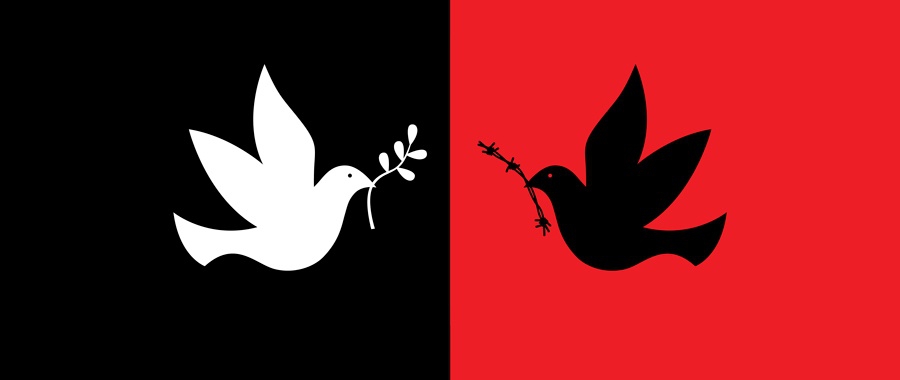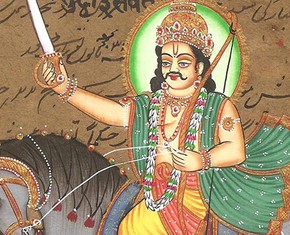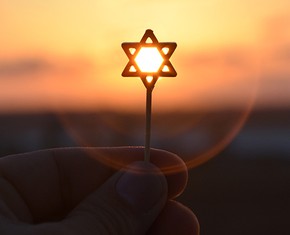The views expressed in our content reflect individual perspectives and do not represent the authoritative views of the Baha'i Faith.
A friend of mine asked me about this line from Baha’u’llah’s Seven Valleys: “… those who journey in the garden land of true knowledge, since they see the end in the beginning, behold peace in war and conciliation in enmity.”
“How can anyone see peace in war?” my friend asked me, adding that the line sounded “Orwellian” to him.
Of course, in George Orwell’s dystopian science fiction novel 1984, he famously wrote “War is peace. Freedom is slavery.”
So what did Baha’u’llah really mean, and what did Orwell mean? Let’s see if we can figure it out by going beyond the surface similarity of both quotations and putting them in context.
RELATED: Walking a Mystical Path through The Seven Valleys
Orwell’s well-known novel, published in 1949, focuses on themes of totalitarianism, mass surveillance, repressive governance, and perpetual warfare. In his book’s future society, Orwell imagined, the ruling class places the nation in a constant state of war – which creates a sense of unquestioning nationalistic patriotism and ensures lasting domestic obedience by keeping the populace permanently manipulated and fearful. Therefore, perpetually warring on other countries stops the nation’s citizens from revolting, hence “war is peace.”
Orwell said he began writing 1984 during World War II, while wondering what would happen if a Stalinist or Nazi government ruled Britain. Throughout the book, images of the fictional nationalist leader, Big Brother, remind careful readers of Josef Stalin, even when describing the mustache both wore and the “Orders of the Day” both issued.
Baha’u’llah, on the other hand, wrote his mystical treatise The Seven Valleys in the early 1860s, to explain and clarify the traditional seven-step Sufi spiritual path seekers could take in their quest to discover the relationship of their souls to the Creator. In traversing those symbolic “valleys” or stages of spiritual development and growth, the seeker comes eventually, after the initial valleys of search and love, to the third valley of knowledge:
He in this station is content with the decree of God, and seeth war as peace, and findeth in death the secrets of everlasting life. With inward and outward eyes he witnesseth the mysteries of resurrection in the realms of creation and the souls of men, and with a pure heart apprehendeth the divine wisdom in the endless Manifestations of God. In the ocean he findeth a drop, in a drop he beholdeth the secrets of the sea.
I explained to my friend that the difference between what Baha’u’llah wrote here, and what Orwell wrote in 1984, is vast. Orwell used the propaganda slogan “War is peace” not only to point out the use of contradictory language by repressive regimes, but to show how never-ending nationalist warfare could be used as a control mechanism.
RELATED: True Religion Never Calls for War

Baha’u’llah used the “war as peace” analogy in a completely different way, as a symbol of seeing beyond present conditions to a possible alternative and a better future.
Later in The Seven Valleys, Baha’u’llah wrote:
Gazing with the eye of absolute insight, the wayfarer in this valley seeth in God’s creation neither contradiction nor incongruity … He beholdeth justice in injustice, and in justice, grace. … He scaleth the ladders of inner truth and hasteneth to the heaven of inner meanings. …
Yet those who journey in the garden land of true knowledge, since they see the end in the beginning, behold peace in war and conciliation in enmity. …
A seeker in the valley of knowledge, Baha’u’llah seems to say here, can develop the ability to transcend the limitations of the material world – especially the vagaries of time. If a spiritual seeker can gain the ability to “see the end in the beginning,” to conceive of the gradual betterment of the world or an end to all war, for example, then that seeker, “if he meeteth with injustice he shall have patience, and if he cometh upon wrath he shall manifest love.”
That’s just one of the many potential meanings of Baha’u’llah’s “seeing war as peace” metaphor. To “see the end in the beginning” suggests that the material person views only the current condition; while the spiritual person envisions its potential resolution in the future.
















Comments
Sign in or create an account
Continue with Googleor